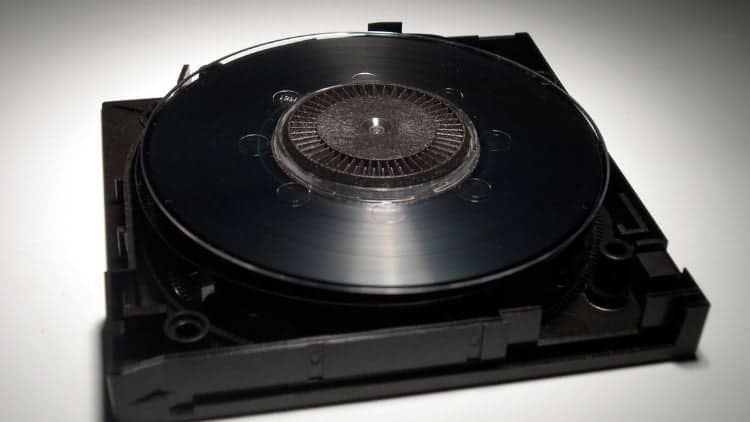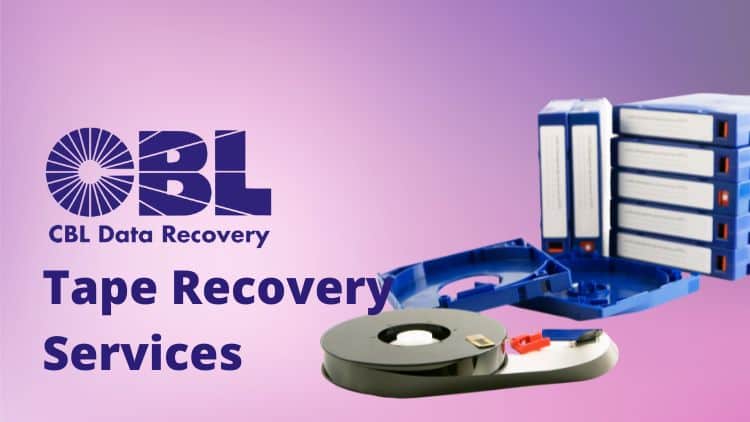Tape Recovery Services are offered by many companies but CBL Data Recovery are part of the few that can offer reliable tape recovery services at affordable price. If you have lost any valuable information like photos, videos or documents then don’t worry about anything just contact us and get best tape data recovery services.
Tape Recovery Services in Singapore
CBL Data Recovery, a leading global provider of Tape Recovery Services, has extensive experience recovering data not only from Backup Tape Media but also from data storage media of all types, including hard disks from desktop computers, solid state drives from laptop computers, external hard disks, portable flash drives, and even mobile devices.
Expert Tape Recovery Service Technicians Ready To Assist You
We have extensive experience extracting seemingly lost data from data storage drives that appear to be unrecoverable. We can recover important business data for you using our expertise and experience in providing tape recovery services.
Authorized by World Leading Technology Manufacturers
CBL Data Recovery Singapore has been authorized by world-renowned manufacturers to work on your Tape Media and provide tape recovery services without voiding the original warranty. We have close working relationships with all of the major manufacturers, which allows us to combine our tape recovery service knowledge and methods to create more efficient data recovery methods when providing tape recovery services.
What Is A Tape Backup?
Backup is the act of making copies of important files for safekeeping. It can be done manually or automatically by using appropriate programs.

Tape backups are useful for a variety of different types of backups including backing up files stored on a personal computer’s internal hard drive, backing up large amounts of file system space for archiving and disaster recover purposes, and backing up large amounts of networked server space for archiving and DR purposes.
Backup tapes can also be useful for restoring data from damaged hard drives. For this we would need tape recovery services to extract the information from the damaged media to tape or extracting the information on the backup to tape to another storage media.
A Brief on Tape Backup Storage Media
Tape was the primary method of storing digital data from the 1960s to the 1980s. Hard disks had previously become more popular and widely available. Hard disks are less expensive, have a higher capacity, and are easier to use than magnetic tapes. Because of these characteristics, hard drives became a viable alternative to tape backups.
Nonetheless, tape drive backup remains one of the primary options for storing data due to its large storage capacity, low cost, dependability and effective disconnected security.
The 5 Common Tape Formats
There are many different types of tape formats available today. Some tape technologies have been around since the the early 1960s while other types are being developed and improved on in more recent years.
Here are five common tape formats that you may encounter.
LTO (Linear Tape Open)
LTO is an open-format tape storage technology that is compatible with a wide range of storage media. Because of its high native storage capacity (up to 12 TB) and enormous compressed capacity, LTO is one of the most widely utilized tape formats (up to 30 TB).
DLT (Digital Linear Tape)
DLT is another prominent tape format that stores data in 128 or 208 linear tracks. DLT cartridges can hold up to 70 GB of compressed storage space, while a new DLT version, SuperDLT, can hold up to 300 GB.
DAT (Digital Audio Tape)
DAT is a storage medium that was originally intended for audio purposes but has now gained popularity as a backup medium. This tape format can store 1 to 80 GB on a 60- to 180-meter tape.
AIT (Advanced Intelligent Tape)
AIT tape format was developed by Sony and was designed for computer data preservation and storage. Generation 5 AIT tapes may store up to 400 GB of data and have a data transfer rate of 24 MBps.
QIC (Quarter Inch Cartridge)
QIC is a magnetic tape storage format with native storage capacities ranging from 60 MB to 25 GB. QIC tapes are mostly used for computer backup.
The Advantages & Disadvantages of Tape Backup
Tape backup despite their changing popularity throughout the years, remain relevant in today’s data centers. The benefits of tape backup make it a very appealing backup storage choice for businesses. Following the benefits, and in order to provide a complete overview of this technology, we discuss some of the pros and cons of backup to tape media.

Advantages of Tape Backup
Cost Effective Per GB
Tape backups are significantly less expensive per gigabyte than disk or cloud backups. Furthermore, tape drives can be used for offline data storage, lowering support and maintenance expenses and is considered the most cost-effective method of storing vast amounts of old data.
Large Storage Capacity
Tape devices have a vast storage capacity that is constantly increasing to suit rising data needs. This high-capacity storage is housed in a compact physical container.
More Power Efficient
Disk storage is a major energy drain in modern data centers. Tape backup is used for offline data archiving. Data is only read or written to tape drives. Therefore when compared to disk or cloud storages, tape drives consume less power and generate less heat than disk drives.
Data Retention Longevity
The endurance of tapes is the primary reason why large organizations continue to employ tape backups. Tape drives may hold data for up to 30 years if properly maintained. As a result, tape backups are employed for long-term data retention and have great archival durability.
Easy Portability
All tape cartridge backups can be readily collected and able to relocate them to a more secure place in the event the tape storage facility is threatened. When compared to cloud or disk storage spaces, to backup substantial amounts of data it must be transferred over the network to a fresh backup site. These processes take time and can disrupt main manufacturing operations.
Quick Scalability
By purchasing new tape drives and adding them to the tape library, you may quickly scale the tape backup infrastructure. However, if you want to increase the capacity of disk-based storage, you will need to purchase extra hardware, which can be rather costly.
Offline Security
Tape backup is a valuable choice for many firms because it may safeguard data against ransomware or infection. Tape backups are stored offline, which means that once the backup operation is completed, the tape storage device is unplugged from the system and cut off the access to any potential attackers.
Disadvantages of Tape Backup
No Random Access
There is no provision for random access to the recorded data; only sequential access is available. As a result, when performing recovery, it takes a long time to locate the required file or directory on a tape media (the tape must be rewound when seeking data).
Susceptible to Magnetic Fields
Unlike hard disk drives, tape cartridges are susceptible to magnetic fields.
Slow Copy Speeds
Data copying speed is slow. Slower read/write speeds than hard disk drives. It can take a long time to restore data from a tape storage backup.
Although the advantages outweigh the disadvantages for tape backup media. Tape recovery services are necessary as tape backups can be exposed to different kinds of issues that can cause it to fail.
Common Issues with Tape Backup Media

CBL processes more LTO data recovery, DLT data recovery, and other tape recovery service cases than other facilities on a daily basis. Below is a run through as to how your tape backup media could be damaged:
- Data cartridges that have been accidentally wiped or overwritten
- Backup tapes that have been damaged or de-spooled
- Damaged tape header or drive head misalignment
- Media that has been harmed by water, smoke, or fire
- File corruption as a result of electrical or mechanical failure
- Backup systems and tape libraries that have failed
- Human Error and Accidental File Deletion
- Tapes that are bent or physically damaged
- Corruption of Software
- Problems with tape configuration or setup
Common issues that affect tape backup media can be danger to your data and will require tape recovery services
Tape backup is a common and effective way of backing up important files, but it has its own set of problems. The most common issue with tapes is the possibility of losing them or having them damaged by improper handling.
FAQ
As a leading global provider of Tape Recovery Services, CBL Data Recovery has 20+ years of experience recovering data from all kinds of different Tape Recovery Backup Systems.
CBL is distinctive, trained and qualified to provide expert and efficient data recovery services for your Tape storage system in Singapore. We provide both standard and express services for Tape Recovery depending on the level of urgency you need to get back your data.
We have been providing reliable and professional Tape Recovery services since we began in 1993. With over 20 years of experience in the industry, we have developed a reputation as a leading provider of Tape Recovery services and are told that we are one of the best in Singapore. We offer fast turnaround times, affordable pricing, and exceptional customer service.
CBL 4-Step Data Recovery Process
Step 1: Free Data Recovery Service Evaluation with Written Quote
Step 2: Data Recovery Is Performed According To Evaluation Findings and Client Approval
Step 3: Data Is Recovered and Placed In Quality Control for Authentication
Step 4: Recovered Data Is Packaged and Returned With Proper Loading Instructions
Timeframe: Estimated within 4-6 Hours from the time your Tape Data Recovery request is received.
Standard Recovery Services: 3-7 Business Days
Rush and Emergency Services: 24-72 Hours
Find Out More About CBL Data Recovery Process
“CBL Is Among the Most Trusted & Respected Names in providing tape recovery services.”
Fast, Secure & Confidential Data Recovery Services
CBL Singapore’s standard service can have your data ready for return three to five working days after the receipt of your hard disk or other media. Our emergency services option is available 24 hours a day, 7 days a week. Under this option, CBL technicians are dedicated to your project until a successful conclusion, usually within 48 hours.
No Hidden Fees
Every single one of CBL Singapore’s customers receives a written quotation from the company. Estimate, assessment, and attempt fees are not anything that CBL will charge.
No Data, No Charge Data Recovery Guarantee
Since 1993, our “No Data, No Charge” policy has been a cornerstone of our business. CBL has the policy that governs all of our recovery projects. There will be no charges if our technicians are unable to salvage information from your data storage media.
90% Data Recovery Success Rate
CBL Singapore has earned the respect of not only our customers but also the data recovery community, due to our high success rate in recovering data. As a result, CBL has succeeded whereas others have failed in recovering data. Our success is built on over 20 years of data recovery experience on all storage media. We have developed in-house software and hardware technology, as well as training programs, to ensure that our specialists have the right tools to complete the job successfully. In summary, we have the best equipment and staff in the industry.




